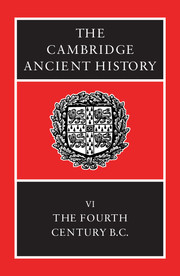Book contents
- Frontmatter
- 1 Sources and their uses
- 2 Sparta as victor
- 3 Persia
- 4 The Corinthian War
- 5 Sicily, 413–368 B.C.
- 6 The King's Peace and the Second Athenian Confederacy
- 7 Thebes in the 360s B.C.
- 8 Regional surveys I: Persian lands and neighbours
- 9 Regional surveys II: the West and North
- 10 Society and economy
- 11 The polis and the alternatives
- 12 Greek culture and science
- 13 Dion and Timoleon
- 14 Macedon and north-west Greece
- 15 Macedonian hegemony created
- 16 Alexander the Great Part 1: The events of the reign
- 17 Alexander the Great Part 2: Greece and the conquered territories
- 18 Epilogue
- Chronological Table
- BIBLIOGRAPHY
- Index
- Map 1: Greece and Western Asia Minor
- Map 9: Egypt
- Map 20: Alexanders campaigns
- References
2 - Sparta as victor
Published online by Cambridge University Press: 28 March 2008
- Frontmatter
- 1 Sources and their uses
- 2 Sparta as victor
- 3 Persia
- 4 The Corinthian War
- 5 Sicily, 413–368 B.C.
- 6 The King's Peace and the Second Athenian Confederacy
- 7 Thebes in the 360s B.C.
- 8 Regional surveys I: Persian lands and neighbours
- 9 Regional surveys II: the West and North
- 10 Society and economy
- 11 The polis and the alternatives
- 12 Greek culture and science
- 13 Dion and Timoleon
- 14 Macedon and north-west Greece
- 15 Macedonian hegemony created
- 16 Alexander the Great Part 1: The events of the reign
- 17 Alexander the Great Part 2: Greece and the conquered territories
- 18 Epilogue
- Chronological Table
- BIBLIOGRAPHY
- Index
- Map 1: Greece and Western Asia Minor
- Map 9: Egypt
- Map 20: Alexanders campaigns
- References
Summary
THE LEADER OF GREECE
The Greek world had long been accustomed to a situation in which there had been two sources of power, Athens and Sparta. The disappearance of Athenian power left the determination of the future to Sparta. Theoretically, the future was clear. The Spartans and their allies had fought the Peloponnesian War for the freedom of Greece and the day on which Lysander sailed into the Piraeus and the demolition of Athens’ Long Walls began was seen as the beginning of that freedom (Xen.Hell. II.2.24). However, the course of the war had inevitably shaped attitudes and aspirations. The simple hope of 431 that all would be well if Athens allowed her allies autonomy had become infinitely complex. It was not only that Sparta had made commitments to Persia which substantially modified the freedom of the Greeks of Asia Minor. The course of the war had produced political changes in many cities which were not easily reversible, and at Sparta itself the effect of success and growing power was to produce a taste for their continuance.
Sparta had serious disqualifications for the role of a leading power, even more for that of an imperial power. Her full citizen population was not more than a few thousand and seems to have been in continuing decline. By the time of the Peloponnesian War, she was already using perioecic hoplites alongside full citizens, and from 424 onwards we find increasing use of freed helots, a group rapidly institutionalized under the name of neodamodeis (new members of the demos).
- Type
- Chapter
- Information
- The Cambridge Ancient History , pp. 24 - 44Publisher: Cambridge University PressPrint publication year: 1994
References
- 3
- Cited by

